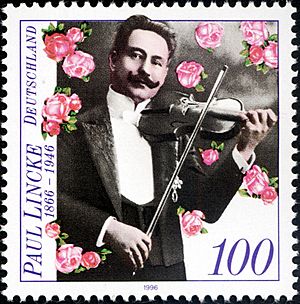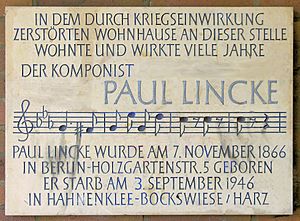Paul Lincke facts for kids
Carl Emil Paul Lincke (born November 7, 1866 – died September 3, 1946) was a German composer and a conductor for theater. He is known as the "father" of the Berlin operetta, a type of light opera. His most famous songs include "Berliner Luft" ("Berlin Air"), which is like an unofficial song for Berlin. This song comes from his operetta Frau Luna. Another well-known song is "The Glow-Worm", from his operetta Lysistrata.
Contents
Early Life and Music Training
Paul Lincke was born on November 7, 1866, in the Jungfernbrücke area of Berlin. His father, August Lincke, played the violin in small orchestras. Paul was only five years old when his father passed away. His mother, Emilie, then moved with her three children to a new home.
Paul showed an early interest in military music. After finishing school, his mother sent him to Wittenberge. There, he trained with Rudolf Kleinow in the Wittenberg City Band. He learned to play the bassoon, which is a large woodwind instrument. He also learned to play the tenor horn, drums, piano, and violin.
Career in Music
Starting as a Performer
Instead of joining the military as a musician, Lincke found a job as a bassoon player at Berlin's Central Theatre. After a year, he joined the orchestra at the Ostend Theatre.
Lincke gained valuable experience playing entertainment and dance music. He worked at several theaters, including the Königsstädtischen Theater and the Parodie-Theater. He played music for vaudeville shows, which were popular variety performances. He also started writing his own songs for famous singers. In 1897, his show Venus auf Erden (Venus on Earth), which was like a revue, opened at the Apollo Theater.
Big Success with Frau Luna
Paul Lincke then worked for two years at the famous Folies Bergère in Paris, France. This was a very well-known music hall in Europe. He returned to the Apollo-Theater with new music. In 1899, his operetta Frau Luna (Mrs. Moon) premiered and was a huge success.
In the same year, he also released Im Reiche des Indra (In the Realm of Indra). In 1902, his operetta Lysistrata came out. The stories for these shows were written by Heinrich Bolten-Baeckers.
By 1908, Paul Lincke became the main conductor and composer for the Metropol Theater. This theater was famous for its amazing shows, which were a big attraction in Berlin.
Life During World War II
When the Nazis came to power in 1933, Lincke kept his important position. He was celebrated by the Nazi government. In 1937, he received the Silver Medal of Honour from his hometown, Berlin. On his 75th birthday, he was made an honorary citizen of Berlin.
His operetta "Frau Luna" was even made into a film in 1941. It starred actors like Lizzi Waldmüller and Theo Lingen.
In 1943, Lincke traveled to Marienbad, Bohemia, to conduct Frau Luna. This operetta's first show in 1899 is seen as the start of the Berlin operetta style. While he was away, his house and his music publishing company in Berlin were destroyed by bombs during the war.
After the war ended, Lincke wanted to go back to Berlin. However, he needed permission from the Allies, who were in control at the time. With help from an American general, he moved to Arzberg, Bavaria, with his housekeeper, Johanna Hildebrandt. She had worked for him for 35 years.
Lincke's health was not good, and the climate in Arzberg made it worse. So, he moved again to Hahnenklee. He passed away there shortly before his 80th birthday. His funeral was held in Hahnenklee, where his grave is still cared for today.
Legacy and Famous Works
Lincke's march "Berliner Luft" ("Berlin Air") is like the unofficial song of Berlin. It is often played as a traditional extra song by the Berlin Philharmonic orchestra at the end of their concerts. This song comes from the 1922 version of Lincke's 1899 operetta Frau Luna. The operetta is about a trip to the moon in a hot air balloon, where people from Berlin meet Frau Luna and her friends. The march was originally from Lincke's 1904 show Berliner Luft.
Other operettas by Lincke include Im Reiche des Indra (In the Kingdom of Indra) and Lysistrata. The operetta Lysistrata includes the song "Das Glühwürmchen," which is known in English as "The Glow-Worm". It was first translated into English by Lilla Cayley Robinson. Later, American songwriter Johnny Mercer changed and added to the lyrics. His version became a hit song for the Mills Brothers in 1952, and many other artists have performed it since then.
Lincke also composed the wedding dance music played in the 1997 movie Titanic. This music is heard while the ship is sinking and in earlier scenes in the dining room.
Selected Operettas
- Venus auf Erden (Berlin 1897)
- Frau Luna (Berlin 1899)
- Im Reiche des Indra (Berlin 1899)
- Fräulein Loreley (Berlin 1900)
- Lysistrata (Berlin 1902)
- Nakiris Hochzeit, oder Der Stern von Siam (Berlin 1902)
- Prinzess Rosine (Berlin 1905)
- Casanova (Darmstadt 1913)
- Ein Liebestraum (Hamburg 1940)
See also
 In Spanish: Paul Lincke para niños
In Spanish: Paul Lincke para niños
 | Madam C. J. Walker |
 | Janet Emerson Bashen |
 | Annie Turnbo Malone |
 | Maggie L. Walker |



